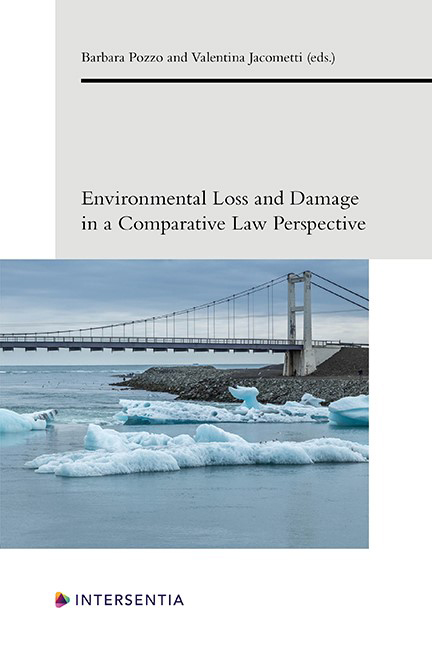Book contents
- Frontmatter
- Preface
- Contents
- List of Authors
- PART I LIABILITY FOR ENVIRONMENTAL HARM IN THE EU
- PART II PRIVATE AND CORPORATE ENVIRONMENTAL LIABILITY
- PART III THE ROLE OF CRIMINAL LIABILITY
- PART IV LEGAL TRANSPLANTS IN THE ENVIRONMENTAL FIELD: THE CASE OF ENVIRONMENTAL LIABILITY
- PART V STATE AND INTERNATIONAL ENVIRONMENTAL LIABILITY
- PART VI CLIMATE CHANGE LIABILITY
- PART VII LIABILITY, CLIMATE CHANGE AND NATURAL HAZARDS: THE ROLE OF INSURANCE
- PART VIII REAL COMPENSATION AND OFFSET REGIMES: THE STRATEGY OF “NO NET LOSS”
- About the Editors
The Legal Framework Against Planned Obsolescence: What Role (If Any) for Criminal Law?
Published online by Cambridge University Press: 26 May 2021
- Frontmatter
- Preface
- Contents
- List of Authors
- PART I LIABILITY FOR ENVIRONMENTAL HARM IN THE EU
- PART II PRIVATE AND CORPORATE ENVIRONMENTAL LIABILITY
- PART III THE ROLE OF CRIMINAL LIABILITY
- PART IV LEGAL TRANSPLANTS IN THE ENVIRONMENTAL FIELD: THE CASE OF ENVIRONMENTAL LIABILITY
- PART V STATE AND INTERNATIONAL ENVIRONMENTAL LIABILITY
- PART VI CLIMATE CHANGE LIABILITY
- PART VII LIABILITY, CLIMATE CHANGE AND NATURAL HAZARDS: THE ROLE OF INSURANCE
- PART VIII REAL COMPENSATION AND OFFSET REGIMES: THE STRATEGY OF “NO NET LOSS”
- About the Editors
Summary
INTRODUCTION
The phenomenon of products with a life cycle pre-set by the manufacturer is now well known to the average consumer, who may often notice the progressive unusability (frequently sudden) of various types of consumer products (especially technological ones). The topic has also become very relevant as a consequence of some recent cases involving major companies (Apple, Samsung, Epson) that have attracted the attention of the competent authorities in Italy and France.
The aim of this chapter is to reconstruct the regulatory framework at the supranational level on planned obsolescence; then we will evaluate the impact of this regulatory framework in some national legal systems. In particular, the case of France will be examined. This is the first (and at the moment the only) country that has adopted a strategy to combat the phenomenon of planned obsolescence that also includes the use of criminal law.
The “planned obsolescence” crime will be assessed from the point of view of the fundamental principles of criminal law, as well as from the point of view of its actual effectiveness. The results of this research may help to answer the following question: can the use of criminal law be considered an “appropriate dissuasive measure” against “planned obsolescence”?
“PLANNED OBSOLESCENCE”: CONCEPT, HISTORICAL EVOLUTION AND HARMFUL EFFECTS
What is “planned obsolescence”? It is not easy to answer this question. In fact there are several types of “planned obsolescence”. The difficulties of definition also derive from the fact that it is a phenomenon that depends to a large extent on the progress of science and technology, particularly technology as applied to the design, production and marketing of products.
Serge Latouche refers to three types of obsolescence: technical, psychological or symbolic, and programmed. Technical obsolescence involves the disuse of machines and appliances due to technical progress, which introduces improvements and innovations of all kinds. Psychological obsolescence refers to disuse of the product caused not by the technical wear and tear or the introduction of a real innovation, but by the product falling out of favour as a result of advertising and fashion, a new look, design or even new packaging. Programmed obsolescence refers to wear or tear arising from an artificial fault, where, from the beginning, the product is conceived by the manufacturer to have a limited life, and this thanks to the introduction systematics of a device that allows for this.
- Type
- Chapter
- Information
- Environmental Loss and Damage in a Comparative Law Perspective , pp. 191 - 208Publisher: IntersentiaPrint publication year: 2021



